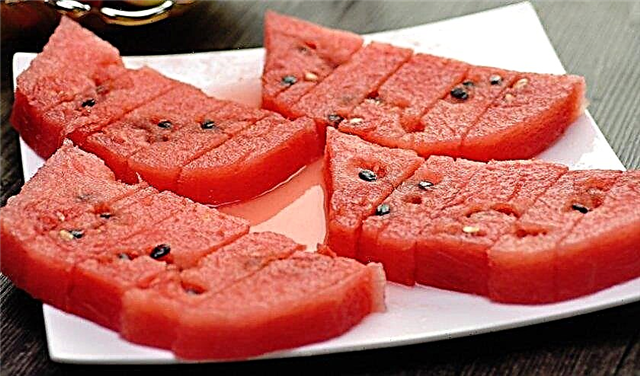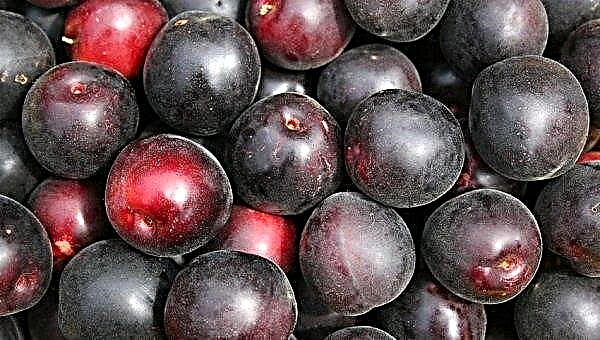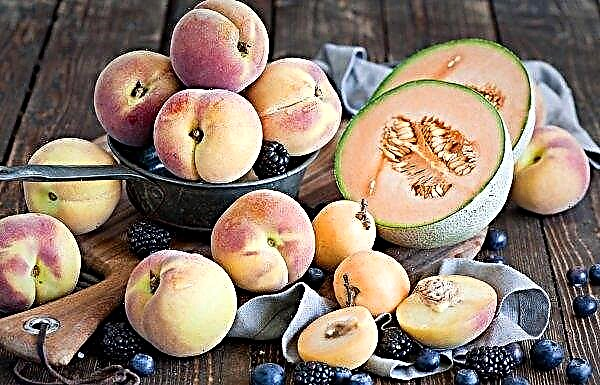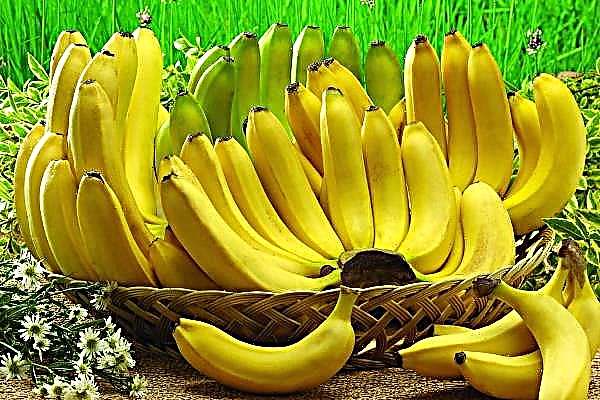Juicy, ripe, summer berry, able to quench thirst, also has considerable benefits for the human body. It is cultivated in about 96 countries of the world and more than thousands of varieties are distinguished, since the use of watermelon favorably affects the general state of health and the functioning of its individual systems.
Calorie content and nutritional value of watermelon
The product is included in the diet list, since its nutritional value is only 27 kcal per 100 g of product.
Moreover, it contains:
- protein - 0.6 g;
- fat - 0.1 g;
- carbohydrates - 5.8 g.
Almost 93% of the total mass is water, and the remaining amount is dietary fiber. However, despite this, there are a lot of vitamins and minerals in the berry:
However, despite this, there are a lot of vitamins and minerals in the berry:
- IN 1;
- IN 2;
- AT 6;
- AT 9;
- PP;
- AND;
- E;
- WITH.
Did you know? You can provide yourself with 25% of the daily need for vitamin C by eating only 1 slice of watermelon.
Trace elements are presented:
- iron;
- phosphorus;
- sodium;
- magnesium
- calcium
The composition of the berry includes:
- sucrose;
- glucose;
- polysaccharides;
- carotenoids (lycopene);
- folic acid;
- amino acids (citrulline).
 The peel is very useful and contains 1 mg / 100 g of iron and zinc. Also, do not throw away seeds, as they contain a lot of chlorophyll, and their use contributes to blood formation.
The peel is very useful and contains 1 mg / 100 g of iron and zinc. Also, do not throw away seeds, as they contain a lot of chlorophyll, and their use contributes to blood formation.What is the use of watermelon for a man's body?
The beneficial properties of watermelon for men's health are in a special composition, since substances such as lycolin and citrulline provide a powerful stimulating effect on the male reproductive system. Popular pharmacies have a similar property.
The action of a natural stimulant is as follows: watermelon juice affects the expansion of blood vessels in the inguinal region, which contributes to an increase in sexual desire. The use of watermelon juice also positively affects the prostate gland, as a good preventive measure.
An erection is improved thanks to a substance called arginine, which provides a rush of blood to the male genital organ.
The benefits of consumption can become noticeable after eating 5-6 pieces.
The use of watermelon for diseases
It is useful in other pathological conditions and diseases of men and women.
- Eating berries favorably affects the overall health of the human body:
- metabolism accelerates;
- the level of "bad" cholesterol is reduced;
- the state of the immune system is strengthened;
- the body receives good nutrition with vitamins and minerals;
- the risk of cancer of the internal organs is reduced due to the large number of antioxidants.
 It is recommended to include watermelon in the diet:
It is recommended to include watermelon in the diet:
- with excess weight;
- with headaches;
- with colds;
- to improve the condition of the skin;
- for the treatment of internal organs and systems;
- to improve blood formation;
- to combat gout;
- to lower blood pressure hypertension;
- to improve the psychological state after stress.
Diabetes
Important information for diabetics is:
- the product contains glucose;
- the glycemic index is less than 60.
Important! The maximum portion of watermelon for diabetics per day can not exceed 400 g to prevent an excess of sucrose.
In season, people with this disease need to keep their diet under control, limiting fish, meat, dairy and flour products.
Urolithiasis disease
The use of the product is recommended due to its ability to remove toxic substances from the body and contribute to the dissolution of salts. Watermelon has an effective diuretic effect, reduces inflammation.
Kidney and bladder diseases
Eating watermelon has a positive effect on people with diseases of this kind. It lies in the fact that the alkaline composition of urine increases, which contributes to the dissolution of stones, and due to the diuretic property, toxins, salts and small stones leave the body and no longer bother a person.
Calcium oxalate crystals in both urine and kidneys are significantly reduced. However, to achieve a significant effect, you should eat about 2-3 kg of sweet berries per day.
Pancreatitis
In this disease, a fresh product is not recommended to be consumed only in the acute stage, and when a person has a stage of remission, it is quite acceptable to enjoy a berry. For normal health, the portion should be limited to 1.5 kg.
Did you know? Pink and red watermelon gives carotenoid lycopene - a powerful antioxidant. Its amount in a giant berry is 1.5 times more than in tomatoes.
Housing and communal services diseases
The normal functioning of the digestive system is facilitated by the presence of fiber in the watermelon and its cortex. It acts on the intestines and removes toxins and toxins.
There are no aggressive acids in the berry, and there are a large number of vitamins and nutrients that positively affect digestion, so it is allowed to use it for gastritis and inflammation of the gastric mucosa. However, a large portion of the sweet delicacy can increase the acidity of the stomach, so you should control the amount of its use. It is advised to start using a portion of 100 g, bringing to 2-3 slices. Eating a watermelon on an empty stomach is not recommended.
It is advised to start using a portion of 100 g, bringing to 2-3 slices. Eating a watermelon on an empty stomach is not recommended.
In the treatment of gastritis, you can use this recipe:
- Dry the watermelon peels.
- Take 100 g of product and pour 500 ml of boiling water.
- Leave to infuse for 30-40 minutes and strain.
- Drink the resulting drink 200 ml in 30 minutes. before eating.
Heart and vascular disease
A decrease in blood cholesterol occurs under the influence of the components that make up this culture - lycopene, citrulline and arginine.
This in turn reduces risk:
- cardiovascular disease;
- heart attacks;
- strokes;
- atherosclerosis.

Contraindications and possible harm
Do not eat the berry as food for people with these diseases:
- urolithiasis (due to a pronounced diuretic effect);
- colitis;
- diarrhea;
- pyelonephritis;
- severe pathology of the prostate and pancreas;
- type 2 diabetes.
Important! Watermelon is not recommended for consumption with pickles, as this can lead to severe swelling. Nutritionists advise using it in a separate dose, some time after the main course of food.
How to choose a quality watermelon?
Before buying striped berries, you should know:
- The collection season falls on August - September.
- The place where the berries are sold should be well ventilated and protected from the sun.
- It should be intact, without cracks, dents or other deformations.
- The color should be even and shiny. The fruit may have a slightly sloping side on which it lay.
- The tail should be dry and crispy.
- When tapping the peel, you can hear a loud sound.
How to choose a watermelon: video
Watermelon is attractive not only for its taste and aroma, but also for a set of useful substances. Its use should be normalized so as not to harm health, since it helps to cleanse the body.












